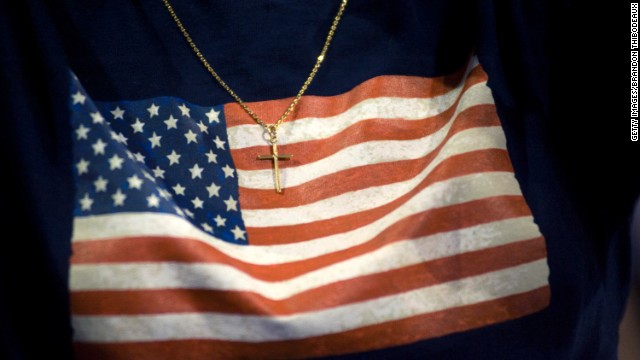Americans Want More Religion in Politics?
Seth Dowland
Last week, I spoke to a CNN blogger about the recent Pew Forum survey showing that a growing number of Americans want more religious involvement in political life. The change from the 2010 midterm season to the 2014 survey was small but notable. The survey reported a six-point increase (from 43% to 49%) in the percentage of Americans who say “churches and other houses of worship should express views on social/political questions.” Conversely, the survey found a four-point drop in the group who wanted churches to “keep out of politics.” The fine-grained data confirmed some of my expectations: Republicans and evangelical Christians were more likely than Democrats and mainline Protestants to call for religious activism in public life. More and more Americans believe the Obama administration is unfriendly towards religion. And 30% of white evangelicals believe themselves to be in a minority on account of their religious beliefs—higher than any other religious group! Christian Smith’s 1998 description of evangelicalism as “embattled and thriving” resonates still, even if Steven Miller’s recent book has shown the decline of the “age of evangelicalism.”
 |
| Kate Bowler loved this image so much I had to include it |
Last week, I spoke to a CNN blogger about the recent Pew Forum survey showing that a growing number of Americans want more religious involvement in political life. The change from the 2010 midterm season to the 2014 survey was small but notable. The survey reported a six-point increase (from 43% to 49%) in the percentage of Americans who say “churches and other houses of worship should express views on social/political questions.” Conversely, the survey found a four-point drop in the group who wanted churches to “keep out of politics.” The fine-grained data confirmed some of my expectations: Republicans and evangelical Christians were more likely than Democrats and mainline Protestants to call for religious activism in public life. More and more Americans believe the Obama administration is unfriendly towards religion. And 30% of white evangelicals believe themselves to be in a minority on account of their religious beliefs—higher than any other religious group! Christian Smith’s 1998 description of evangelicalism as “embattled and thriving” resonates still, even if Steven Miller’s recent book has shown the decline of the “age of evangelicalism.”
A few of the report’s findings surprised me. The recent increase in the percentage of Americans who believed religion should become more involved in political life stood out most notably, but I was also curious in the rise among people who believed homosexuality was a sin and the relative unimportance of abortion, birth control, and gay marriage. The latter three issues ranked last in a list of eleven issues voters identified as “very important” for the 2014 elections (the economy and health care topped the list).
As I attempted to find a signal in the noise, I developed a couple armchair hypotheses about these data. First, I suspect a growing portion of the Americans who want religion to become more involved in politics have issues other than the holy trinity (abortion, birth control, gay marriage) in mind. If voters think the environment is a more pressing political issue than gay marriage—and they do, according to the Pew Forum survey—at least some of them understand environmental stewardship in religious terms. The CNN reporter I spoke to turned to an evangelical pastor for his thoughts about moral decline and its relationship to the loss of religious influence in political life. He predictably fingered the acceptance of abortion rights and gay marriage as culprits in a cultural decline. But I’d love for these types of stories to investigate how the Democrats, mainline Protestants, and secular Americans who called for more religious involvement in political life conceive of religion.
Second, both the framing of Pew’s questions and the character of the responses confirm that Americans understand “religion” partly on terms defined by American political life. When my wife—who lived in the UK for eight years—posted this CNN story on Facebook, one of her English friends noted, “I'm actually astounded there are people who stand up in public and warn others about a ‘radical homosexual agenda.’ That was my favourite part of the article, hands down.” To be sure, there are plenty of Americans who find fretting about a “radical homosexual agenda” ridiculous, but few of them would be astounded by the reality of public opposition to homosexuality or the notion that it has something to do with religion. Quite the opposite, in fact: fully half of Americans consider homosexuality a sin, up from 45% four years ago. Many gay rights supporters, conversely, have developed religious defenses of gays and lesbians. One’s religious identity often depends on one’s stance on a handful of political issues, gay marriage being one.
American political life shapes both religious discourse and the category of religion itself (legally, politically, and culturally). American religious believers are attuned to these realities. They understand religion to include the key political issues of the day. Today, it’s the deficit and illegal immigration; fifty years ago, it was communism. Asking Americans if churches should be more involved in politics, then, misses the point somewhat. Churches are inherently political. What I’d like to know more about is how the political alignments of “religiously motivated” voters are changing. We know that regular churchgoing correlates quite highly with voting Republican, but I’m intrigued by the smaller (but growing) numbers of the less devout who also want to see religious candidates in office. For them, is religion just a correlate for ethics? Do they conceive of a wider array of issues as religious? Or is there some other explanation?

Comments